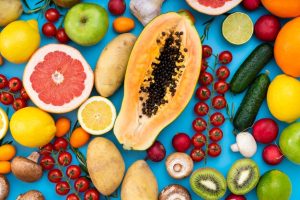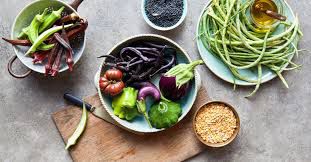ARTICLES
Fruits that are Best for Ulcer Patients
Fruits that are Best for Ulcer Patients

Ulcers, particularly stomach or peptic ulcers, are painful sores that develop on the lining of the stomach, small intestine, or esophagus. Often caused by Helicobacter pylori bacteria or long-term use of anti-inflammatory medications, ulcers can be aggravated by certain foods. While dietary adjustments alone cannot cure an ulcer, including specific fruits in your diet can be beneficial in managing the symptoms and supporting digestive health.
The right fruits can help soothe the stomach lining, provide essential nutrients, and avoid triggering more discomfort. In this article, we’ll look at several fruits that ulcer patients can enjoy safely and discuss why they’re suitable choices. We’ll also cover how these fruits can fit into a balanced diet that promotes ulcer healing.
1. Bananas
Bananas are frequently recommended for those with ulcers due to their mildness and low acidity. They provide a soothing effect on the stomach lining and create a protective barrier against acid. Bananas contain pectin, a type of fiber that helps regulate digestion and ease irritation. They also have natural antacid properties, which may assist in balancing stomach pH and reducing discomfort.
Bananas are easy to digest and make a great snack on their own or in smoothies. They can be combined with other fruits or dairy products that are also friendly for ulcer patients, offering a quick and nutritious option to calm the stomach.
2. Apples
Apples, particularly when eaten with the skin, provide soluble fiber, including pectin, which promotes digestive health. The fiber in apples helps regulate the digestive tract, which can benefit ulcer patients by reducing constipation and maintaining smoother digestion.
Apples also contain antioxidants, especially in their skins, that may play a role in preventing ulcer aggravation. For those with ulcers, eating peeled apples or lightly cooking them can make them even gentler on the stomach, reducing the risk of any discomfort.
ALSO READ: Best Hospitals in Nigeria for Ulcer Treatment
3. Pears
Like apples, pears are gentle on the stomach and offer similar benefits with a high fiber content and soothing properties. Pears are low in acidity, making them a safe choice for people with ulcers. The fiber in pears can support digestion, helping to prevent acid from irritating the ulcer site.
For a softer option, try poaching or baking pears, which brings out their natural sweetness and makes them even easier to digest. Pears also pair well with other ulcer-friendly foods like honey or yogurt, creating a balanced snack or dessert.
4. Melons (Cantaloupe, Honeydew, Watermelon)
Melons are well-known for their high water content and low acidity, making them ideal for those with ulcers. The water content in melons helps dilute stomach acid, providing a soothing effect. Additionally, melons are packed with essential vitamins, particularly vitamin C and A, which are beneficial for immune support and tissue repair.
Cantaloupe and honeydew melons are gentle on the stomach, while watermelon, with its refreshing quality, can help keep you hydrated. For ulcer patients, adding melons to salads or enjoying them as a hydrating snack is an easy way to soothe the stomach without worrying about acid flare-ups.
ALSO READ: Common Causes of Stomach Ulcers in Nigeria
5. Papaya
Papaya is a tropical fruit that can benefit ulcer patients in several ways. It contains an enzyme called papain, which aids in digestion by breaking down proteins and easing the workload on the stomach. Papaya is also rich in fiber and water content, which promotes a smooth digestive process and may help reduce irritation.
Papayas are an excellent source of vitamin C and other antioxidants that support healing. They can be eaten fresh, added to smoothies, or even blended with yogurt for a stomach-friendly breakfast or snack option.
ALSO READ: Cost of Ulcer Treatment in Nigeria’s Private Hospitals
6. Avocado
Avocados are unique among fruits because they provide healthy fats and are low in natural sugars. Their creamy texture is easy on the digestive system, and their healthy fats can provide a soothing layer in the stomach, potentially helping to reduce acid irritation.
Avocados are also high in fiber, potassium, and vitamins C and E, which are known to support healing and tissue repair. Including avocados in meals as a spread, or adding them to salads or smoothies, offers a gentle and nutritious choice for people managing ulcer symptoms.
7. Berries (Blueberries, Strawberries, Raspberries)
Berries are packed with antioxidants and vitamins, especially vitamin C, which can support immune health and healing. Although some berries may be slightly acidic, they generally do not cause discomfort when consumed in moderation. For people with ulcers, blueberries, strawberries, and raspberries can provide antioxidants that protect the stomach lining from further damage.
Berries are also high in fiber, which can help with digestion and maintaining regular bowel movements. Mixing berries into yogurt or oatmeal creates a stomach-friendly meal rich in fiber and nutrients.
8. Pineapple
Pineapple contains bromelain, an enzyme that aids digestion and has natural anti-inflammatory properties. This can benefit ulcer patients by promoting easier digestion and potentially reducing irritation. However, pineapple is slightly acidic, so it’s best consumed in moderation or combined with non-acidic foods.
For instance, blending pineapple with banana in a smoothie can help balance the acidity while providing the digestive benefits. If you notice any discomfort with pineapple, consider reducing the portion or opting for one of the less acidic fruits on this list.
9. Peaches and Apricots
Peaches and apricots are gentle fruits with a moderate level of acidity, making them suitable for ulcer patients in smaller amounts. They provide fiber, vitamins, and minerals that support healing and digestive health. Peaches and apricots also offer beta-carotene, an antioxidant that contributes to tissue repair and immune support.
These fruits can be enjoyed fresh, canned (in water or light syrup), or baked. They make a good addition to breakfast dishes, such as oatmeal or yogurt, or a light, nourishing dessert.
ALSO READ: 14 Simple Things Men Do to Deceive Girls
10. Grapes
Grapes are another fruit that ulcer patients can enjoy in moderation. They are mild, easy to digest, and provide antioxidants that protect the stomach lining. Grapes also contain water, helping to keep you hydrated, which is beneficial for digestion.
Try to opt for seedless varieties, as seeds can be harder to digest and may irritate the stomach. Eating a handful of grapes on their own or adding them to salads can offer a tasty, ulcer-friendly snack.
11. Coconut
Coconut, especially coconut water, is incredibly hydrating and gentle on the stomach. Coconut water has a soothing effect, potentially reducing acid levels in the stomach. Coconut milk can also be used as a dairy alternative for those with lactose intolerance.
Fresh coconut meat is also mild and can be a great addition to an ulcer-friendly diet, providing healthy fats and fiber. For those with ulcers, including coconut in smoothies, water, or cooking can offer both flavor and gentle nutrition.
Tips for Including These Fruits in Your Diet
When including these fruits in your diet, consider the following tips to keep your meals ulcer-friendly:
1. Avoid Excessive Acidity. Even though some fruits are mildly acidic, they can be enjoyed in moderation if they don’t trigger discomfort. Pair them with non-acidic fruits like bananas or melons.
2. Eat Smaller Portions. Large meals can aggravate ulcer symptoms. Eating smaller portions of fruit throughout the day, rather than large quantities at once, can reduce the risk of discomfort.
3. Opt for Blended or Soft Forms. For those sensitive to raw textures, consider consuming fruits in softer forms, like purees or smoothies, to reduce the risk of irritation.
4. Avoid Adding Sugar or Spices. Sugar, spices, and other additives can exacerbate ulcers, so try to eat fruits as naturally as possible. A touch of honey can be a gentler sweetener if needed.
Fruits to Avoid for Ulcer Patients
While some fruits can be beneficial, others may aggravate ulcers due to their high acidity. Citrus fruits like oranges, lemons, limes, and grapefruits can cause increased acid production in the stomach. Tomatoes and pomegranates are also acidic and may irritate the stomach lining.
ALSO READ: Natural Remedies for Treating Stomach Ulcers in Nigeria
Discover more from 9jaPolyTv
Subscribe to get the latest posts sent to your email.

 POLYTECHNIC NEWS9 hours ago
POLYTECHNIC NEWS9 hours agoFederal Polytechnic Daura Equips Staff with Research Skills at NRF Induction Workshop

 POLYTECHNIC NEWS9 hours ago
POLYTECHNIC NEWS9 hours agoFederal Polytechnic Ado-Ekiti Clarifies NYSC Mobilization for Evening and Part-Time Students

 POLYTECHNIC NEWS8 hours ago
POLYTECHNIC NEWS8 hours agoTragedy in Bauchi: Abubakar Tatari Ali Polytechnic Student Killed in Hostel Robbery Attack

 POLYTECHNIC NEWS8 hours ago
POLYTECHNIC NEWS8 hours agoAnambra Poly Rector Honored at COOU’s 25th Inaugural Lecture Series

 POLYTECHNIC NEWS9 hours ago
POLYTECHNIC NEWS9 hours agoOYSCATECH Public Administration Marks 10 Years with Drug Donations, Awards, and Cultural Fiesta

 POLYTECHNIC NEWS18 hours ago
POLYTECHNIC NEWS18 hours agoIMT Enugu Departments Go Digital: Council of PROs Launches Social Media Drive to Showcase Campus Excellence

 POLYTECHNIC NEWS8 hours ago
POLYTECHNIC NEWS8 hours agoKogi State Polytechnic to Begin Degree Programmes in Partnership with Federal University Lokoja


































